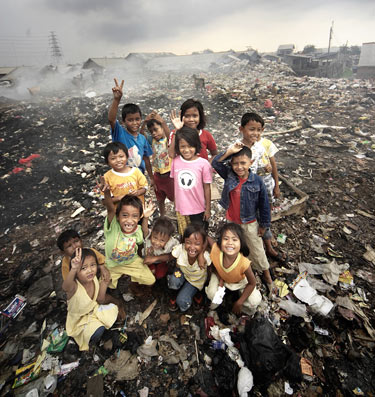Children in Poverty Win When You Search Kindly
Here’s something very easy you can do to help children in poverty.
- Use Search Kindly as your search engine during May. (It’s powered by Google.)
Thanks to your votes, Compassion will receive 100 percent of Search Kindly’s ad revenue for the month of May. Their goal is $1,000, but we’re hoping for more than that. How’s that for transparency? And how about $2,500 as a goal?
There’s a thermometer on their homepage where they show how much money has been generated so far. Right now, we’re at $84.
Here’s how it works:
More eyeballs = more money = more children helped.
More advertising revenue is generated from unique visits than from frequent visits. What that means is the “Money Thermometer” goes up more quickly for each new pair of eyes that view the site than it does for repeat visits, but the keywords there are “more quickly”. Repeat visits definitely help!
For those of you who get a bit overwhelmed at the technical side of all this web stuff, like some of us on the Web Team 🙂 here’s your To Do list.
- Use Search Kindly as your search engine.
That’s it.
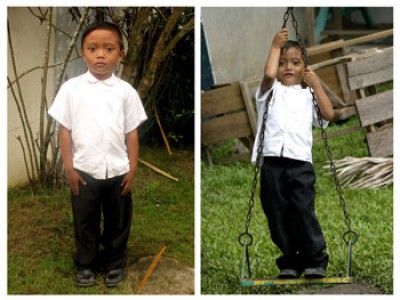
Why Does My Sponsored Child Look So Scared?
Tell me if you can relate to this: When I first started sponsoring my Compassion child, I clung so tightly to that one picture I had of him — my one lifeline into his world. OK, so I knew from his bio that he helps his mom wash dishes and loves art, but I would hold that little picture in my hands and examine every detail, trying to glean whatever information I could.
Maybe Next Time, a Smile
I knew that she was a sweet little girl, but it wasn’t her face that told me so. Her face had a hard look, as if smiling was an indulgence; something reserved for close friends and family only. But the hardness in her face wasn’t a frown. It wasn’t unhappiness I saw there. It might have simply been shyness and uncertainty.
After all, who was I? Some American who swooped in to pass around the good feelings before returning to vast shelters of wood, composite and stone? Someone who wanted to “do little good” and make himself feel better before returning to his consumer Christianity?
It’s possible all of this was on her face and in her four-year-old mind. Children are, after all, very perceptive.
But maybe I was projecting. Maybe my mind was simply painting my own guilt on her stoic face.
I stood in the courtyard playground of that child development center in Bonao, hours outside of Santo Domingo and less than a day after arriving in the Dominican Republic (DR), and the sun’s heat felt more like that given off by an interrogation lamp than life-giving warmth.
Why was I really here anyway?
I came to the DR to lead a men’s retreat with three others. Two other Compassion employees and one elder of a local church. Our host was an employee of the DR country office. The next day, we were to begin speaking at his church and leading what we hoped would be a revival for the men of Santo Domingo.
So I was there to speak. To challenge, encourage and uplift.
But even more, I discovered that I was there to listen. And to be challenged, encouraged and uplifted myself.
Our first day in the country was a Compassion day. A chance for three of us to see, for the first time, the results of the work of thousands around the globe working to further the cause of Christ.
It was a holiday in the Dominican Republic, so we didn’t receive the 300-child welcoming party I’d heard is often customary when visiting a Compassion child development center.
Instead, we were greeted by a handful of children. Several boys and, as I remember it, one little girl with a hard face, but who radiated sweetness nonetheless.
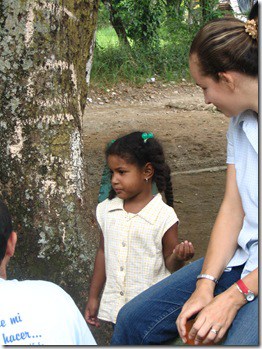
But from where? I wonder now what drew me so strongly to this sweet child, only present that day because her mother, Rosa, is their volunteer cook.
Perhaps it was the English.
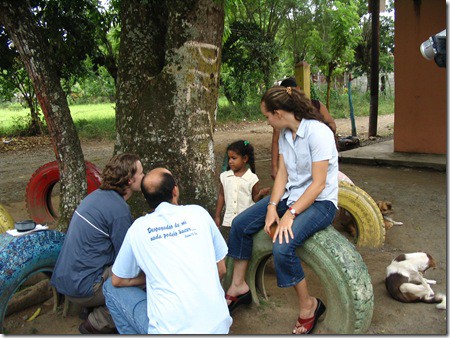
Shortly after meeting Ana Maria, I knelt down to speak with her, with our friend and translator, David, at my right.
“Hello Ana. My name is Brandon.”
And before David could translate, she spoke.
“Hello,” she said, in English. There was a softness in her voice, one that smoothed her features and melted my heart.
“God bless you, Ana,” I said.
“God bless you,” she replied, again without waiting for David to translate. The center facilitator, who was sitting nearby, smiled.
“She wants to learn English.”
“That’s wonderful.” I looked back at Ana Maria and smiled at her.
She didn’t smile back, but the hardness I had seen at first was gone. Better yet, the image of hardness I projected on her face at the first was replaced with hope.
Cautious hope. And a desire to smile, but maybe not just yet.
Ana didn’t have a sponsor before that day. But by the time I left, she did.
I wonder sometimes if she remembers meeting me. If she recalls meeting an American man who would return home in days and slide unwittingly back into Western and indulgent living, but who now had a lifeline to need, reality and truth. A lifeline that somehow sustains both the giver and receiver.
I hope she does remember. Two years from now, my wife and I plan to return to the DR to visit Ana Maria and her mother. My wife will meet them for the first time, and I will see them once again. We’ll hug, pray, play and speak English and Spanish to each other.
And maybe, just maybe, we’ll smile.
Brandon Satrom is the Enterprise Applications Architect for Compassion. He works in IT evaluating both new and emerging technologies and helping Compassion IT make the best use of existing technologies.
A Thousand Thanks
We asked, and you responded. Mille grazie! A thousand thanks. Actually, 2,618 thanks. That’s how many votes we received.
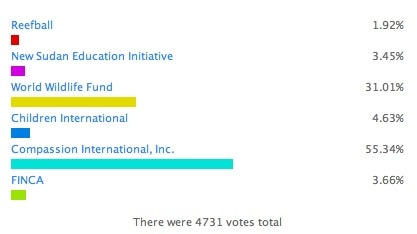
You can help advance the work they’re doing by telling your family and friends about them. The more people who view the ads on their site, the more ad revenue that gets generated and donated. That’s how it works.
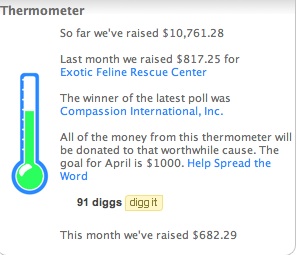
Will You Help Us …
Will you help us say thank you to Tammy Chalfant, who organized the first ever Compassion Sunday event at Farmland Friends Church (FFC)?
71 children now have sponsors.
Please tell Tammy and her pastor, Kris Sorensen, how much you appreciate their work.
And Shaun Groves too. He spoke at the event, and he’s a TIRELESS advocate for children in poverty.
Then, take a hop over to SearchKindly.org and help us win $1,000!
SearchKindly is a non-profit organization that donates 100% of its ad revenue to charity. This month Compassion is competing against four other charities for the donation. And right now, we’re in SECOND place with $500 on the table. But the amount goes up every time someone visits the website.
Please visit, and please vote. The contest ends “sometime” on Sunday, April 27.
- Help us win!
- Vote every 8 hours.
- And help us set a record for how much SearchKindly donates.
Listen
I like to listen. My wife will tell you I’m not very good at it. But I really do like to listen to the way people say things … and the meaning behind certain words or phrases. I recently tried an experiment. I paid close attention to some of the things we say around the house, and then tried to imagine how different those conversations would be if we were living in a developing country. Think of how these phrases would be different — or non-existent — if we were living in one of the poorest countries of the world:
- “You wanna go out to eat tonight?”
- “What would you like for lunch today?”
- “There’s nothing on TV.”
- “It’s so nice out…let’s go for a drive with the top down on the Jeep.”
- “It’s starting to get warm again. We need to think about turning the sprinkler system back on in the yard.”
- “I need to run to the store to get some more diapers and Diet Coke. Can you think of anything else we need?”
- “Morgan is outgrowing his clothes so fast, is it okay with you if I go to the store to see if I can find him some new pajamas?”
- “I’ll empty out the dishwasher.”
- I’m going to take a shower.”
- “Feel like ordering a movie?”
- “The housing market is so bad right now. I don’t know if it’s the right time to sell our home. But we sure need more space.”
- “I’m starving!”
- “What would you like for dessert?”
I would bet that most of those phrases are NEVER uttered in the homes of children who attend Compassion child development centers. And the ones that are, are said in a much different context.
Wouldn’t it be interesting to listen in on their conversations for a week?
Sardines or Lessons From the Field
I can’t get this photo out of my head. In my job each day, I look at tons of photos from the field, but some stick with me.
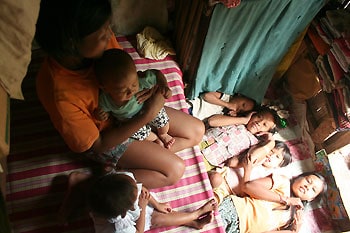
When I was a little kid I had a nickname: Heater Legs. At night, my legs would reach roughly 375 degrees and, allegedly, flail wildly all night. My sisters would fight over who had to sleep next to Heater Legs on vacation, ‘cause it wasn’t gonna be a fun night.
I wonder if one of these cute little kids is a Heater Legs. Or a Snorer. Or a Bed Hog … umm, I guess that would be a Ground Hog in this case. And yet despite this sleeping situation, here they lie smiling. Some days this family only eats bananas. Some days they don’t eat at all. And yet when Edwin asked them to show him how they sleep, they rushed to their places, laughing and pushing each other playfully. They don’t mind it because they keep each other warm.
It reminds me of something Paul Henri, our communications specialist in Burkina Faso, said to me. Paul Henri just recently started working for Compassion; he goes out to the projects to get those great stories about how children are affected by Compassion’s ministry. And this is what he had to say about the kids he gets to meet: “Something great that I have learned from children I interview is their happiness despite poverty. They seem not to be affected by poverty. When I talk to them, I usually see a large smile on their faces. This makes me remember Jesus, who was sleeping in the stern of the boat while a storm was raging.”
These children in the Philippines and Paul Henri in Burkina Faso sure give me perspective. It’s hard to keep up my attitude of grumbling when I remember those little faces lined up on the floor. Faces that reflect joy despite the storm they’re in.
It’s not that we don’t have real problems here, too. We might be facing unemployment or divorce or infertility or cancer. Our problems are real and hard. But what I’m learning from the field is that I can’t wait for life to be perfect to live in Christ’s joy. I sometimes think that if only this one thing happened, I’d be happy. But I can’t wait to have joy and peace until my storms have passed.
Oh, for the day I can become like a child — to live each day with a kid’s playful smile on my face. To have Jesus’ peace and joy today, despite my worries, just like those cute little kids in the Philippines.
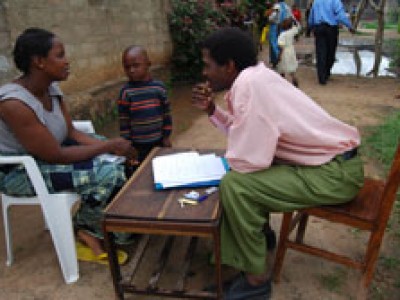
Historic Registration in Tanzania: The 50,000 Registered Child
Compassion International Tanzania (CIT) registered* its 50,000 child two months ago on Februray 16.
This historic registration ushered in a new era for us. It was a moment to put down our tools, celebrate the Lord’s favor, and thank Him for what he has done and for His faithfulness. It was a milestone for the Tanzanian ministry, an achievement worth celebrating.
Now let’s see how we reached the 50,000 child mark and also learn about how our child registration process works.
The milestone occurred in Tabora, more than 650 kilometers from Arusha, where the head office of CIT is located. But the search actually began months earlier.
Finding Church Partners
Before going into a new area, CIT conducts country mapping to determine the level of poverty in one area as compared to another. Country mapping is necessary so we can determine where the greatest ministry need is.
After country mapping, we conduct a baseline survey to determine if the areas identified with a high degree of poverty have Christian churches whose mission matches ours.
This is critical because we work through the local church — it is the local church that actually implements the program and cares for the children. If there is no church, our ministry model won’t work, regardless of the degree of poverty that exists there.
We ask questions, such as:
- Does the church have classrooms to accommodate the children?
- Do they have people who can teach and work with children or who can learn to assist children?
- Are there peopleand children who can help the program continue?
This baseline survey helps us decide which areas and churches are a good fit. Of course, in all the stages we keep praying and asking God to lead us in the right path and to bring people who will be willing to sponsor children and release the resources needed.
After the baseline survey, we gather all the potential church partners for vision casting. In this gathering we share the importance of ministry to children and call on the church to awaken to the call of Jesus Christ to fulfill the Greatest Commandment.
After this, we choose the potential church partners and invite them to a partnership meeting. At this one-day meeting, it is time to pray together and for us to give relevant partnership documents to the new church partners.
If the partners agree on the conditions, they sign a partnership agreement with us. These partnership agreements give room to church partners to start preparing environments to begin the ministry. They start recruiting project workers and create a child ministry committee formed from church members.
The church has to find those able and qualified to work in the project as project coordinator, project accountant, project social worker, and project health worker.
Once all the project workers are chosen, they attend the “One-Month Child Ministry Foundation Course” that all project workers go through.
In this course, the newly recruited project workers are trained on how to implement the ministry and how to minister to each child individually.
They also learn what is expected of them and different ways and procedures of reporting and giving feedback to us. They get to know the organizational structure of CIT, the departments involved, and how each department works.
Screening and Registration
All this leads up to child screening and registration. (more…)
Idol Gives Back
I’m a fan of American Idol. I’m an especially big fan this week.
Wednesday marks the second year that the Fox reality show takes a break from their regular programming to do something virtually unheard of on television these days — focus on something other than making money.
Idol Gives Back is an effort to raise awareness and funds for children in need around the world. Last year the event raised $76 million. This year they’re shooting for $100 million.
Whether or not Fox brings in the millions this week that they normally make on the show, the event probably does enough for their public image to make the monetary sacrifice well worth it.
Whatever their motivation, though, it’s refreshing to see the spotlight shining on those who truly need it but rarely get it — children in poverty.
Among the recipients are organizations like the Global Fund, Malaria No More, Children’s Health Fund, Children’s Defense Fund and Make It Right, Brad Pitt’s campaign to help New Orleans recover from Hurricane Katrina.
There will be celebrities. There will be music. There will be tears. Millions of viewers will undoubtedly be moved to donate. Some will likely be profoundly impacted by the stories they hear and the images they see. Hopefully many hearts will be softened towards the plight of children in poverty and people will do more than just give once … they will begin to get involved.
I’m just excited that for a couple hours this week, children in poverty will have a real voice. That’s really what Compassion is all about.
What do you think? Do you agree? Will you be watching?
While Compassion might not be featured on the show, we are working just as hard to fight for children in poverty. Here are a couple specific things you might like to know about:
Malaria: A Plague of the Poor
In recognition of World Malaria Day on April 25, Compassion has produced a new radio special.
AIDS
Compassion’s AIDS Initiative is focused on Africa. Yet HIV and AIDS are also significant threats to children outside of Africa and for that reason Compassion is also conducting HIV/AIDS work in non-African countries.

Equipping the Church
An short video explaining how we work with the local church in the developing world to release children from poverty in Jesus’ name.
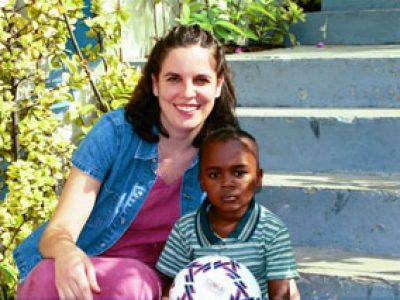
Proof
I sponsor a child in Haiti named Youvens. In the seven years I’ve sponsored him, I’ve never, ever seen him smile. Even when I visited Haiti and brought him a soccer ball. No smile. He played soccer with me, ate lunch with me and never let go of the ball. But he never smiled.

